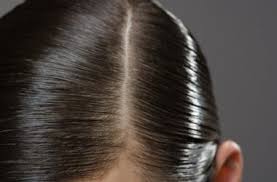1. You’re on your period.
Yep—blame it on Aunt Flo. As if your monthly menstruation didn’t already wreak havoc on your appearance (read: bloating and breakouts), hormonal fluctuations can cause your oil glands to go into overdrive. As a result, your scalp may feel more greasy than at other times during the month, Joshua Zeichner, M.D., director of cosmetic and clinical research in dermatology at Mount Sinai Medical Center, tells SELF. This is also the same reason that you may develop acne breakouts. He recommends trying a salicylic acid shampoo to help remove excess oil from the scalp. Try Neutrogena T/Sal Therapeutic Shampoo ($7) or LivSo Moisturizing Shampoo ($19) during that time of the month.
2. You’re constantly wearing a ponytail.
Throwing your hair back in a ponytail might be a quick way to cool off and get your hair off your neck, but experts warn that this low-maintenance style can actually make hair look greasier at the roots. “Pulling the hair together in a ponytail may lead to the accumulation of oil and dirt on the scalp underneath the ponytail holder,” says Zeichner. “Essentially, this oil, dirt and grease gets trapped in the tiny crevices between your strands because the rubber band serves as a roadblock.” When it’s hot as hell, it makes sense to pull your hair back, but doing so can make grease pool on your scalp. “If your hair is matted down your scalp may not be ‘breathing’ and oil may not spread through the hair shaft,” says Jon Reyman, master hairstylist and co-founder of Spoke & Weal in New York City. Let your hair down more to combat accumulation.
3. You’re using the wrong shampoo.
There’s a reason more and more hair-care brands are marketing products to specific hair types: Everyone’s hair is different and requires a different balance of ingredients. “Using the wrong products for your hair type or overusing those products can cause a buildup of product that ends up irritating the scalp,” says Calvin Louis, hairstylist and founder of ManeFrame in Los Angeles. Zeichner agrees that this buildup of product at your roots can trap oil there and make your hair feel greasy. To prevent this, Louis recommends looking for styling products that are lightweight and absorb thoroughly into the hair. You can also try using a clarifying shampoo once a week. “A clarifying shampoo gently cleanses away any product buildup or outside pollution buildup in your hair,” he says.
4. You’re over-shampooing.
If you’re sick and tired of your greasy locks, your instinctual reaction might be to shampoo it on the reg. But Zeichner warns: Over-washing can quickly lead to more oil. “Over-washing your hair strips your hair and scalp of natural oils,” Louis explains. “The body remedies this by producing even more oil to make up for lost oils, which then creates a buildup and makes your hair feel and look oily.” Not sure if your excess grease is the result of over-washing? Louis suggests going a day or two without washing and seeing what happens—or, only washing your hair once or twice a week.
5. You have curly hair.
Reyman points out that oil from the scalp slowly moves down the hair between washes, conditioning the hair shaft from roots to ends. Brushing helps this happen more thoroughly by spreading oil along the length of the hair with each stroke. But many people with curly hair don't brush their hair (or do it infrequently). If you aren’t brushing your hair, oil will start accumulating around the scalp. “In some cases this means oily scalp and dry ends,” says Reyman. Zeichner also points out that another reason for more grease when your strands are curly is that you might be tempted to wash it less, since it likely holds volume and texture days after a shampoo. But this only gives the oil more of a chance to accumulate on the scalp and the hair itself, he says.
6. You have dandruff.
You might think that if you have dandruff or scalp psoriasis, that dry itchy skin means your hair will be dry, too. But Zeichner warns that both of these conditions might seriously contribute to greasy locks, and it's a bit of a vicious cycle. “Scalp oil promotes an overgrowth of yeast on scalp skin, which in turn promotes inflammation and flaking,” he says. “This may further trap oil and make the hair look greasy." Your best bet is to use a scalp-friendly shampoo and conditioner, like Mizani’s Scalp Care Anti-Dandruff line, which uses peppermint oil and cucumber extract to control scalp flaking and itching.



 Contact Us
Contact Us






 Hospitals
Hospitals
 Doctors
Doctors
 Diagnostic
Diagnostic
 Pharmacy
Pharmacy
 Health Tips
Health Tips
 Blog
Blog

























Comments